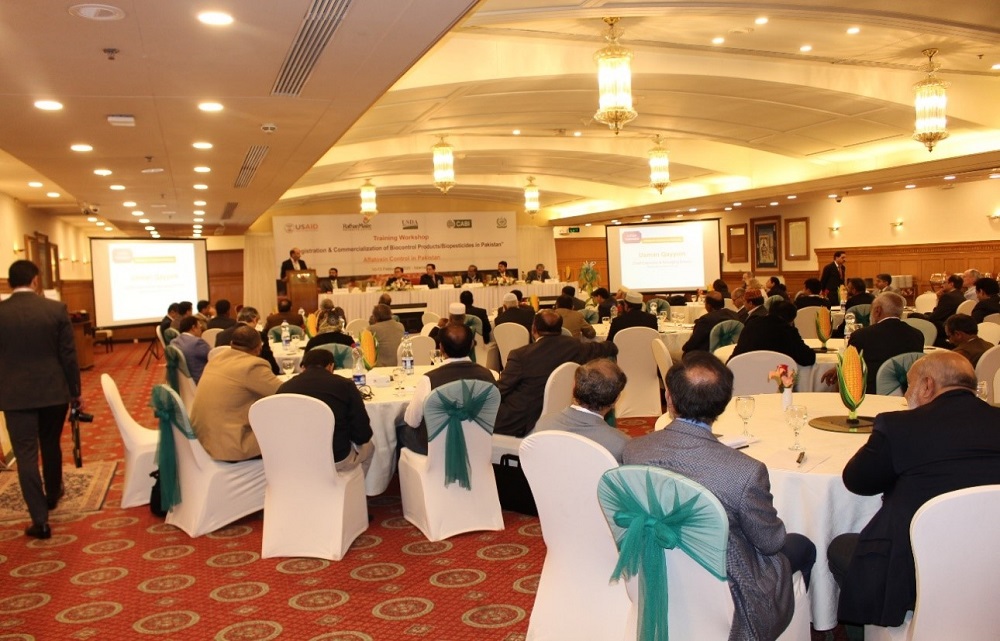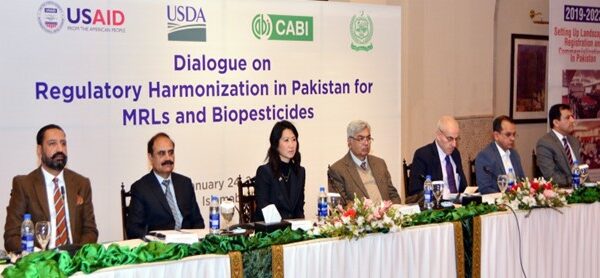
Pakistan has taken the regional lead to mitigate the aflatoxin issue in South Asia. USAID/USDA has joined hands with CAB I to lead this new initiative in collaboration with the National Agricultural Research Centre (NARC) and Rafhan Maize Products Co. Ltd. This will help to safeguard the health and nutrition of Pakistan people.
To sensitize the stakeholders and government agencies working in agriculture on aflatoxins and its possible biological control through indigenous AflaPakTM, a training workshop, from 10-13 February 2020, was organized in Islamabad where Dr Michael Braverman, Manager Biopesticide, Organic and International Capacity Building Programs IR-4 Project, at Rutgers University in the USA, acted as trainer to share his global experience to handle such biocontrol products for aflatoxin mitigation.
During the workshop participants from the Department of Plant Protection, officials from agriculture departments of all the five provinces of Pakistan, academia staff members, agribusinesses and subject experts on aflatoxins, discussed and shared the current mechanisms to register biocontrol products/biopesticides in Pakistan.
The participants also piloted brain storming sessions on avenues to register AflaPakTM in Pakistan to mitigate the aflatoxin issue in South Asia. Dr Braverman also briefed the participants on the data requirements, exemption petitions, forms and procedures and on labelling requirements with special reference to biocontrol product/biopesticides.
Mr Sher Afghan Khan, Additional Secretary, Ministry of National Food Security & Research (MNFS&R) in his remarks stated that aflatoxin is one of the main reasons causing stunted growth in children and I congratulate CABI and its partners on taking a pioneer step to control aflatoxins in maize crop. He also added that the ministry doors are always open for the support required to register AflaPakTM .
Mr Rey Santella, Agricultural Counselor at USDA, said that CABI is one of the fortunate partners of USDA in Pakistan. The main focus of the aflatoxin program is to get AflaPakTM registered – a biocontrol agent which will deal with the threat of aflatoxin. AflaPakTM registration will not only enhance the livelihood of farming communities but also address the issue of food security.
Dr Babar E. Bajwa, Regional Director of CABI, commented: “We have a long-standing history with the USDA, PARC and MNFS&R cooperation. CABI is always trying to come up with the science which delivers to the mandate of Pakistan and agricultural problems like aflatoxins in maize crop causing export hindrance and food security.”
On 10th February 2020; 72 participants, including officials and subject experts from USAID, USDA, NARC, Rafhan Maize Products Co. Ltd., Ministry of National Food Security and Research, academia and allied agribusiness agencies, participated in the inaugural session of the training workshop on registration of biocontrol products/biopesticides in Pakistan. From 11-13 February 2020 this training workshop was further attended by 35 subject experts to learn about the mechanism for AflaPakTM registration.
This training workshop will not only be helpful to define the mechanism for AflaPakTM but also open a new chapter of green technologies registration in Pakistan and can also attract foreign direct investment (FDI) for Pakistan.
Additional information
Aflatoxin Control Programme
Find out more about CABI’s work on aflatoxin control in Pakistan.
Authors:
Dr Sabyan Faris Honey – Project Manager
Contributors:
Dr Hamzah Shahbaz Bhatti
Dr Muzammil Farooq
Mr Saqib Ali
For more information, please contact:
Deborah Hamilton
USDA
202-720-0335
Deborah.Hamilton2@usda.gov
Related News & Blogs
Sindh farmer gains global recognition for sustainable cotton farming innovations
Photo credit: Evronas/Better Cotton. Location: Better Cotton Conference, Istanbul, Türkiye, 2024. Sindh farmer Fateh Muhammad Laghari has gained recognition for his commitment to sustainable cotton farming practices as part of the Better Cotton Member…
5 December 2024




